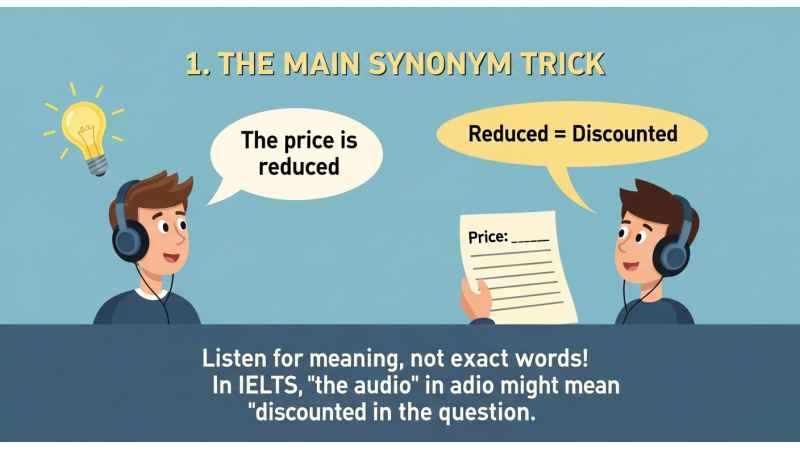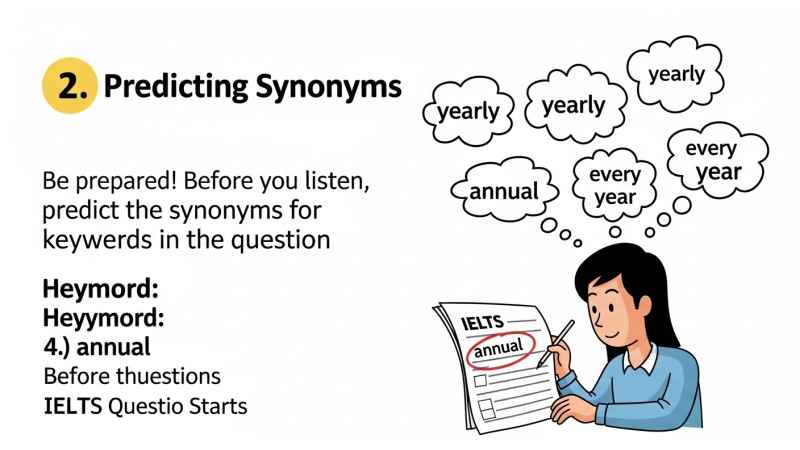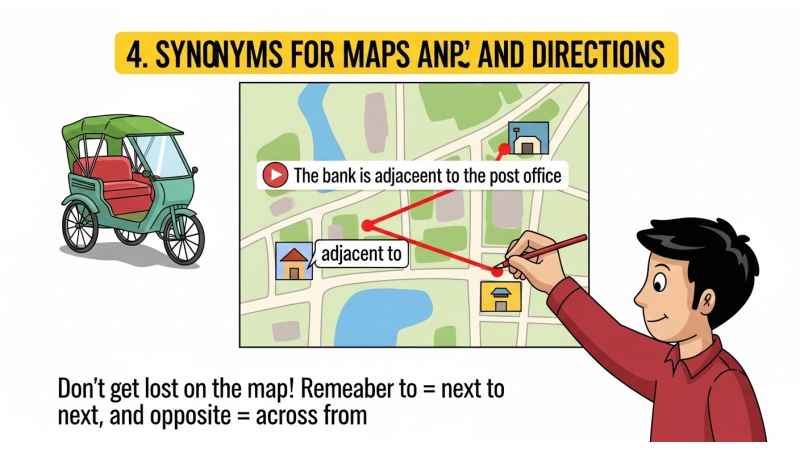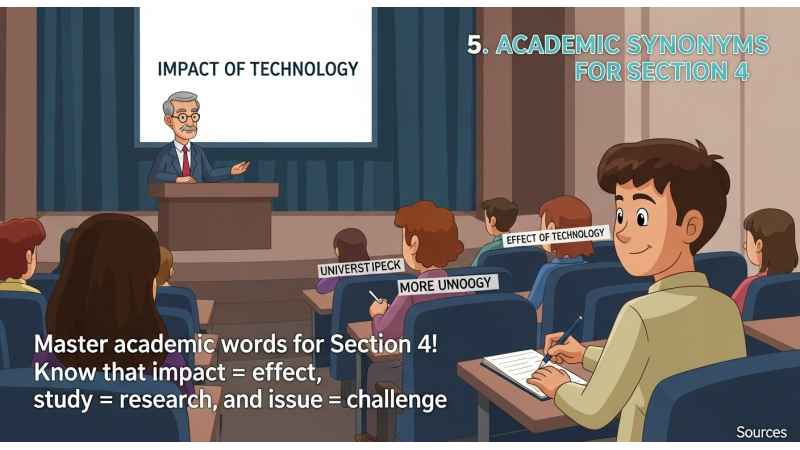Understanding synonyms is critical in IELTS Listening. In this test, you will often hear one word in the audio but see a different word in the question or transcript, and those are synonyms – words with the same or similar meanings. For example, the audio might say “The price is reduced,” while the question states “The price is discounted.” If you don’t realize that “reduced” and “discounted” mean the same thing, you could miss the answer. In short, being able to recognize synonyms and paraphrases is a big trick for boosting your listening score and getting that Band 7+.
In this guide, we’ll show why synonyms matter in Listening, explain how they appear in each question type, and give you tricks to spot them. You’ll see categorized lists of common synonyms and real examples with practice tasks. By the end, you’ll know exactly how to identify and use synonyms to your advantage.
What Are Synonyms in IELTS Listening?

Synonyms are simply words that have the same or very similar meanings (e.g. buy = purchase, start = commence). In IELTS Listening, synonyms and paraphrases are used constantly to test your vocabulary range and comprehension. The question wording might use one term, while the speaker uses a different word that means the same thing. For example, if the question says “Where is the bookshop?” the speaker might say “the newsagent is next to the bank.” (Not exactly synonyms in this case, but similarly, if the question uses “bookshop,” the speaker could say “library” or “newsagent” to confuse you.)
In practice, this means don’t expect exact word matches. Always be ready for paraphrasing. As one IELTS trainer notes, “Don’t expect to hear the exact words written in the questions. The speaker will most likely paraphrase the information”. Building a strong synonyms vocabulary helps you connect the dots between what you read and what you hear.
Why Synonyms Matter in the Listening Test
Recognizing synonyms is a must for higher bands. When you improve your ability to spot synonyms, you’ll:
- Link question and audio quickly. You’ll hear the idea even if the wording is different.
- Avoid confusion and wrong answers. If a question uses “in the near future” and the audio says “soon”, you’ll know it’s the same idea.
- Show richer vocabulary. Especially in practice tasks and sample answers, using varied vocabulary helps you think like a Band 7+ student.
One source emphasizes that understanding synonyms helps you interpret audio segments more effectively because recordings often contain paraphrased versions of key ideas. In fact, failing to match synonyms can cost you points: if you miss that “reduced” = “discounted”, you won’t get that answer correct.
Tip: Always try to predict synonyms for keywords as you read each question. This primes your brain to catch them in the audio. For example, if the question asks about “flexibility,” think of synonyms like adaptability or versatility before the audio starts. Being mentally prepared for alternative phrasing is half the battle.
How Synonyms Appear in Each Question Type

Synonyms and paraphrasing can show up in any listening question. Here’s how they typically appear in each question type, with examples and tips:
- Form/Note/Table Completion: In these gap-fill tasks (Section 1 or 2), the question gives you a label or heading, and the speaker may use a synonym. For example, if the form asks for “Postcode,” the speaker might say “ZIP code” or vice versa. Or if the form says “Type of item,” the speaker might use “product” instead. Listen for equivalent words. (Tip: Even in short answers, you must write exactly what you hear, so it’s best to catch the exact phrase. But knowing synonyms helps you follow along.)
- Multiple Choice: Here you read options A, B, C, etc., and listen for which one matches. Usually none of the options uses the exact words from the recording. Instead, the correct option is often paraphrased. For example, in a sample multiple choice question, the choices might be A) Creativity B) Punctuality C) Flexibility, and the audio says “We need someone who can adapt to changing situations easily.” You must recognize that “adapt to changing situations” is a synonym for “flexibility,” so you choose C. In another scenario:
- Practice Example: Listen to “Don’t forget to pack some thermal wear, as it can get chilly at night.” If the question is “What does the speaker suggest bringing?” with choices (A) Warm clothes (B) Hiking boots (C) Camping gear, you see that “thermal wear” is a synonym for “warm clothes.” The answer is A.
- Sentence Completion: These are fill-in-the-blank questions. The key words in the question sentence are paraphrased in the audio. For instance, the question might say “She plans to ___ her degree by taking online courses.” In the audio, you might hear “She intends to complete her degree through evening study.” The blank should be filled with “complete” (synonym of finish). Always pay attention to word limits. You usually need to write exactly what you hear, so don’t try replacing it with a different synonym in your answer. The strategy here is to understand the spoken version of the idea and fill the exact word.
- For example, in a practice sentence-completion question, the exam might give: “The lecture will (start) at 10 a.m.” The audio says “The lecture will commence at 10.” You should write “begin” or “start” (whichever fits the allowed words), knowing that “commence” is a synonym for “start.”
- Matching: In matching questions (often Section 1 or 3), you match items in one list to items in another. The descriptions or statements to match are often rephrased. For example, the matching question might list “New University dorm” and the description in audio might say “students live on campus” instead of “dormitory”. As IELTS Jacky notes, you should “expect synonyms and paraphrasing to be used” in matching. An example: If one statement in the audio says “Our hostel is located in the countryside,” and the question choice says “It is in a rural area,” you see “countryside” vs “rural area” – they’re synonyms. Pick the matching letter accordingly.
- Map/Plan/Diagram Labeling: For maps and plans, you label locations or features. The synonyms here are usually in place or direction vocabulary. For instance, the map might label “Auditorium,” while the speaker says “lecture hall.” You should know those can be the same place. Or the recording might say “opposite the post office,” while the map marker is “bank”; you match “bank” because it is opposite the post office. Common direction synonyms (e.g. opposite = across from, by = next to, on the left = on the left-hand side) often come up.
- Summary Completion: In Section 4, summaries of an academic talk have missing words. Expect extensive paraphrasing and synonyms here. For example, if the summary says “The effect of the new policy was significant,” the speaker might have said “The impact of the new policy was significant.” Recognize “impact” = “effect.” Practice listening to lectures and spotting when key terms (like theory, method, conclusion) are rephrased.
In all question types, the rule is the same: listen for meaning, not just exact wording. If you hear a word that’s different from the question but means the same thing, use it.
Proven Strategies for Spotting Synonyms

Here are some tricks top students use to catch synonyms efficiently:
- Read Ahead & Predict: Before the audio starts, read the questions and options carefully and think of synonyms for the key words. For example, if the question mentions “debate,” predict that the speaker might say “discuss” or “argue.” Worddemy’s Synonym Strategy recommends thinking of synonyms for key words as you read the choices. This primes your brain to catch those alternatives when you listen.
- Focus on Meaning, Not Words: When listening, match the idea of what you hear to the question. For instance, even if you miss the word “annual,” you might hear “yearly.” If the question has “annual,” know they are the same. It helps to ignore small differences and concentrate on context.
- Build a Synonym Bank: Keep a notebook (or digital list) of common IELTS words and their synonyms, organized by topic or section. For example, under “Education” you might list study ⇄ research, lecture ⇄ presentation, grade ⇄ score. Britsana English School recommends developing a personal list of synonyms for common IELTS vocabulary. By practicing with these pairs, you train yourself to recall them quickly in the test.
- Practice with Real IELTS Materials: Use Cambridge IELTS books or official online tests that include transcripts. Listen with the transcript in hand and circle or highlight where synonyms are used. For example, if the transcript uses “commute” and the question says “travel,” note that pair. IELTS TestPro advises “Listen with Your Eyes”: watch or replay IELTS listening videos and note down key words and their spoken synonyms.
- Use Flashcards and Apps: Turn your synonym lists into flashcards. On one side write the original word, on the other write synonyms. Quiz yourself regularly. There are also IELTS vocabulary apps (like IELTS Test Pro’s app) where you can review synonym exercises. The more you expose yourself to paraphrased language, the faster you’ll recognize synonyms in test conditions.
- Train with Sample Questions: Do lots of practice listening tests and review the transcripts. After each practice, check every answer you got wrong and see if a synonym caused the mistake. Edubenchmark and other IELTS sites often remind students to “identify synonyms that may be used in the audio recordings” for matching and other tasks. Use these errors as learning opportunities.
- Learn Direction Words for Maps: For map/plan questions, learn different ways to give directions. Synonyms like “opposite” = “across from,” “beside” = “next to,” “facing” = “in front of” can be crucial. For example, Jacky’s map vocabulary lists include pairs like “left-hand side / to your left” that students often mix up. Being clear on location synonyms will make map questions much easier.
- Stay Calm and Listen Carefully: Under exam pressure, it’s easy to panic and miss paraphrasing. Train yourself to stay focused on listening, even if a word sounds unfamiliar. Often it’s a simple synonym that you know but didn’t expect.
By applying these strategies, you turn synonyms from confusion traps into score boosters. Remember: the speaker’s wording can change, but the meaning stays the same.
High-Frequency IELTS Listening Synonym Lists

Here are some common synonyms that frequently appear in IELTS Listening contexts. We’ve grouped them by topic to help you study. Practice using these in sentences so you remember their meanings.
Everyday & General:
- buy = purchase, acquire
- start/begin = commence, initiate
- end/finish = conclude, complete
- big/large = huge, enormous, massive
- small/little = tiny, minuscule, petite
- help = assist, aid, support
- good = positive, beneficial, excellent
- bad = negative, poor, subpar
- right (correct) = accurate, precise
- number = figure, digit, amount
Shopping/Travel:
- accommodation = housing, lodging
- price/cost = fee, charge, expense
- booking/reservation = appointment, arrangement
- tour/visit = excursion, guided trip
- district/neighborhood = area, zone
- map/plan = blueprint, layout
- postcard = souvenir, mail-out
Education/Academic:
- study/research = investigation, analysis
- lecture/talk = presentation, seminar
- project/assignment = task, work
- problem/issue = challenge, obstacle
- solution/answer = resolution, remedy
- conclusion/outcome = result, finding
- data/information = figures, details
- evidence/proof = support, confirmation
- method/technique = approach, procedure
- topic/subject = theme, area of study
- increase/growth = improvement, advancement
- idea/concept = notion, principle
Jobs & Business:
- job/position = role, employment opportunity
- company/firm = business, enterprise
- hire/employ = recruit, appoint
- salary/wage = pay, remuneration
- sell/market = vend, trade
- order/purchase (online) = buy, acquire
- cost/fee = price, charge
- discount/reduction = rebate, markdown
Time/Sequence:
- yesterday/past day = the previous day, the day before
- today/now = currently, at present
- tomorrow/future day = the next day, upcoming day
- soon/shortly = in a moment, before long
- daily/each day = every day, day-to-day
- weekend = Saturday and Sunday (often left as is in context)
Places & Directions:
- left-hand side = on the left, to the left
- right-hand side = on the right, to the right
- north/east/etc. = N/E (compass terms)
- straight ahead = go straight, continue forward
- turn right/left = take a right/left
- opposite (across the street) = facing, across from
- adjacent to = next to, beside
- beyond = past, further along
Numbers & Amounts:
- half = 50%, one-half
- quarter = 25%, one-quarter
- double = twice as much, twofold
- dozen = 12 units
- numerous = many, a large number of
- few/some = a number of, several
Each of these pairs is common in everyday English and appears in IELTS listening scripts. For instance, [19] shows “cost” and “price”, “gym” and “fitness center”, etc., as synonyms. From [37], we see “research” and “study”, “project” and “assignment”, “data” and “figures” in academic discussions. Review these lists regularly so that they become second nature.
Mini Practice Exercises
Let’s apply these ideas with some mini practice examples. In each case, focus on the meaning of the words.
- Practice 1 (Multiple Choice):
- Question: What does the speaker suggest packing? A) Warm clothes B) Hiking boots C) Camping gear
- Audio: “Don’t forget to pack some thermal wear, as it can get chilly at night.”
- Explanation: “Thermal wear” is a synonym for “warm clothes.” (Answer A).
- Practice 2 (Sentence Completion):
- Fill in the blank with a word meaning the same as in the audio: “The meeting will ________ (start) at 10 a.m.”
- Audio: “The meeting will commence at 10 a.m.”
- Answer: “begin” or “start”. (Synonym for commence).
- Practice 3 (Short Answer/Labeling):
- In a map labeling exercise, suppose the audio says “The library is adjacent to the post office.” If the map labels one building “Library,” the other “Post Office,” you should write “next to” or “beside” for a question asking “Where is the library?”. Here “adjacent to” = “next to”.
- Practice 4 (Matching Example):
- You hear in the audio: “Our guest house is located out in the countryside, far from the city.” If one of the descriptions to match is “rural area”, you would match “countryside” with “rural area”. They’re synonyms in this context.
- Practice 5 (Diagram Labeling):
- If the audio says “turn right at the station, then it’s just beyond the museum,” and the question’s blank says “(To the blank) of the museum.” you should fill “right-hand side” or “right”. (Here, “beyond” gives a clue to turn right; knowing that “beyond” can imply “further along” helps match the direction).
After each listening practice, review the answers and underline any synonyms or paraphrases you missed. This will train your ear to notice them next time.
Practical Vocabulary-Building Tips

To build the synonyms knowledge you need for IELTS Listening preparation:
- Use Cambridge IELTS books: These official practice tests include listening scripts. Listen first, then read the transcript and circle any words you didn’t understand or synonyms you could replace. For example, Cam IELTS 14 Script might show “complicated” while the question says “complex”. Make note of these as study items.
- Read and Listen to Real English: Podcasts, TED Talks, news – whenever you encounter a word, think of alternatives. The Worddemy strategy even suggests listening to an English video and pausing to predict synonyms for key ideas.
- Audio-Based Synonym Drills: Listen to short speeches or lectures and pick out 5–10 important words. Pause and say aloud a synonym before continuing. This active recall strengthens your ability to match synonyms under pressure.
- Thematic Vocabulary Lists: Organize your learning by topics (travel, education, business, etc.) as we did above. If you’re focusing on travel, learn synonyms like journey/trip, hotel/inn, cost/price, etc., so they come to mind during related listening sections.
- Regular Practice: Try daily or weekly listening practice. Use apps or websites (IELTS Test Pro, British Council) that highlight vocabulary. Make flashcards for any new synonyms you encounter.
Summary & Call to Action
In IELTS Listening, mastering synonyms is your secret weapon to Band 7 and above. As the experts note, “mastering IELTS synonyms is an essential skill for achieving a higher IELTS Listening score”. By expanding your synonym vocabulary, you’ll catch more answers correctly and feel confident that different wording won’t trip you up.
In summary: Focus on meaning, not just words. Use our tricks – predict synonyms, build a synonym bank, practice with real tests and transcripts – to improve. Review the categorized lists above and test yourself on the practice examples.
Now, take action: Next time you do a listening practice, apply these techniques. Pause after each question and ask yourself, “Did I catch a paraphrase or synonym?” Keep a notebook of any new pairs you find.
With consistent practice and the right strategies, you’ll “Master IELTS Listening Synonyms” and be well on your way to that Band 7+ score. Keep listening actively, keep expanding your vocabulary, and good luck on your IELTS journey!

About the AuthorWelcome to TechIELTS. I’m Md. Jahangir Alam, an experienced engineer with over 15 years in electrical and automation systems. Alongside my engineering career, I’ve developed a strong interest in English language learning and IELTS preparation.
I hold a Duolingo English Test score of 135 (IELTS 7.5 equivalent) and am currently pursuing an M.Sc. in Cyber Security from Royal Holloway, University of London. I use my technical background to create clear, structured IELTS learning materials for students and professionals.
👉 Connect on LinkedIn
